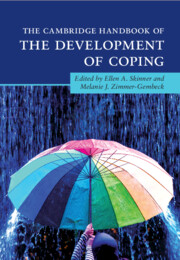Book contents
- The Cambridge Handbook of the Development of Coping
- Cambridge Handbooks in Psychology
- The Cambridge Handbook of the Development of Coping
- Copyright page
- Contents
- Contributors
- Preface
- 1 A Systems Perspective on the Development of Coping
- Part I Theoretical Perspectives on the Development of Coping
- Part II Methods for Studying the Development of Coping
- Part III Neurophysiological and Experiential Bases of the Development of Coping
- Part IV Psychological Foundations of the Development of Coping
- Part V Social Contexts and the Development of Coping
- 17 Coping Development as an Everyday Interpersonal Process
- 18 Parenting, Socialization of Emotion, and the Development of Coping
- 19 Temperament, Family Context, and the Development of Coping
- 20 Interparental Conflict, Parental Relationship Dissolution, and the Development of Children’s Coping
- 21 Autonomy, Self-Determination, and the Development of Coping in Adolescence
- 22 Peer Stressors and Peer Relationship Dynamics in the Development of Coping
- 23 Income, Income Inequality, Community, and the Development of Coping
- 24 Culture, Diversity, Context, and the Development of Coping
- Part VI Application and the Development of Coping
- Index
- References
24 - Culture, Diversity, Context, and the Development of Coping
A Phenomenological Perspective
from Part V - Social Contexts and the Development of Coping
Published online by Cambridge University Press: 22 June 2023
- The Cambridge Handbook of the Development of Coping
- Cambridge Handbooks in Psychology
- The Cambridge Handbook of the Development of Coping
- Copyright page
- Contents
- Contributors
- Preface
- 1 A Systems Perspective on the Development of Coping
- Part I Theoretical Perspectives on the Development of Coping
- Part II Methods for Studying the Development of Coping
- Part III Neurophysiological and Experiential Bases of the Development of Coping
- Part IV Psychological Foundations of the Development of Coping
- Part V Social Contexts and the Development of Coping
- 17 Coping Development as an Everyday Interpersonal Process
- 18 Parenting, Socialization of Emotion, and the Development of Coping
- 19 Temperament, Family Context, and the Development of Coping
- 20 Interparental Conflict, Parental Relationship Dissolution, and the Development of Children’s Coping
- 21 Autonomy, Self-Determination, and the Development of Coping in Adolescence
- 22 Peer Stressors and Peer Relationship Dynamics in the Development of Coping
- 23 Income, Income Inequality, Community, and the Development of Coping
- 24 Culture, Diversity, Context, and the Development of Coping
- Part VI Application and the Development of Coping
- Index
- References
Summary
This chapter makes explicit the role of context and coping processes for identity formation among diverse youths. The study of coping is enriched by a human developmental theoretical approach that acknowledges the shared status of vulnerability for all humans given that encountered risks are mitigated (or not) by myriad protective factors and accompany all individuals’ developmental journeys. The application of Spencer’s phenomenological variant of ecological systems theory facilitates the study of coping strategies. The authors discuss the social ramifications of endemic economic inequality on developmental contexts, which frames the cultivation of coping strategies, i.e., whether adaptive or maladaptive; thus, experiences ultimately become incorporated into an individual’s identity. To highlight the multifaceted nature of risk, the chapter examines the experiences of Black youths in urban areas and the radiating effects of the exogenous shocks on youths’ domains of development. The authors call for new avenues of study and the provision of risk-mitigating supports to ensure cultivation of productive adaptive coping strategies, which enhance diverse youths’ positive identity outcomes.
Information
- Type
- Chapter
- Information
- The Cambridge Handbook of the Development of Coping , pp. 581 - 594Publisher: Cambridge University PressPrint publication year: 2023
